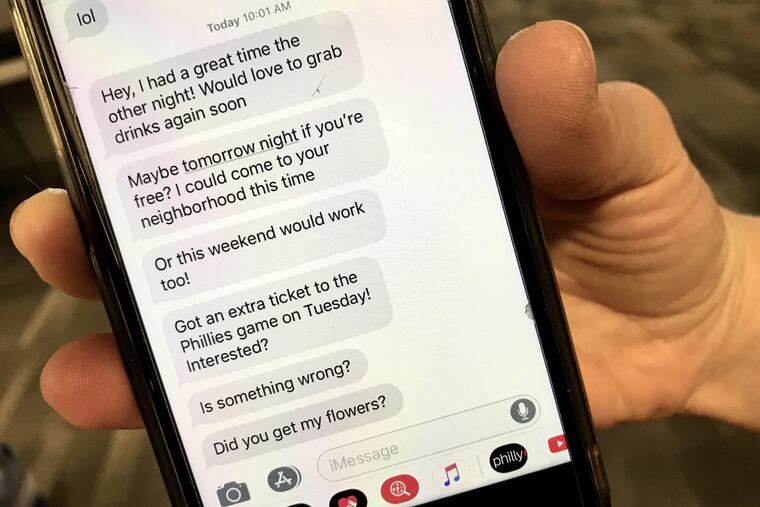Do you believe in soulmates? You're more likely to 'ghost' your date
It turns out ghosting may be related to one's faith in finding "the one."

Nikki Witte has been on many first dates. After four or five of those disappointing encounters, when the guy texted to set up another, she left him hanging with the hope he'd take the hint.
"I feel bad," said Witte, a pharmacy student who was sipping a Red Bull at Independence Beer Garden Tuesday afternoon. "But you can tell from the get-go it's not going to work."
"Ghosting," the act of ignoring someone, is a modern term for an age-old move: Ending a relationship by cutting off contact, even as the former partner tries futilely to set up another date. Witte, 24, admits that ghosting sounds cruel, but she says she's a romantic, and if they don't click from the start, it's not worth trying to salvage.
It turns out ghosting (a term added to the Urban Dictionary in 2006) may be related to her faith in finding "the one." According to a recent study, daters who believe in destiny — soul mates, love at first sight, the stuff of romance novels — are more likely to engage in ghosting (or perhaps one of its iterations: orbiting, benching, breadcrumbing).
In two related surveys, researchers asked more than 500 men and women online about how strongly they believed in destiny and growth, the idea that a relationship is malleable with effort. They compared those results with answers to questions about attitudes toward ghosting, including whether they've ghosted (one in five admitted to it), or been ghosted (a quarter said they had), and when ghosting might be acceptable.
Survey results showed people with a stronger belief in destiny were 31 percent more likely than those with a weaker belief to report they had ghosted a romantic partner. They were also 43 percent more likely to consider using ghosting as a way to end a relationship and 24 percent less likely to "think poorly of a ghoster."
Gili Freedman, a postdoctoral researcher at Dartmouth College and author of the study, said it's important to note that believing in destiny and the idea that relationships can grow with work aren't mutually exclusive. But having stronger expectations when it comes to destiny simply means a person is more likely to ditch a partner probably because he or she felt that even with effort, the relationship just wouldn't work. Why people do it without saying squat is a question the researchers didn't ask.
Still, daters view ghosting to varying degrees. Overall endorsement was fairly low, with researchers finding about a quarter of people saying it's an acceptable relationship termination practice at any point. But those with strong a belief in destiny were nearly 25 percent more likely to think ghosting is fine after two or fewer dates.
Witte said she wouldn't ghost someone after more than two dates. After that, she said, the partner is owed an explanation of some sort.
Lauren Montvilo, 25, of South Philadelphia, said she doesn't consider herself the romantic type and is decidedly not a ghoster. But she has encouraged some of her female friends to ghost guys they've determined aren't compatible even before a first date. But she said she would never advise a friend to ghost after going on a few dates.
And, Montvilo admitted, she's been there herself.
After meeting a guy at a bar and talking and then texting, she "never heard from him again," she said. "And I was like, 'Whatever. Dating sucks.' "
Dillon Pierce, 23, of Fort Washington, was more straightforward about his ghosting tactics: "when there's zero connection" or "when the sex isn't good." He said it's especially easy to ghost women with whom he doesn't share mutual friends because there's little chance of running into the woman in the future and having a confrontation.
But has Pierce been ghosted? "Probably," he said.
The researchers also extended the survey to friendships, finding similar results: People with stronger destiny-type beliefs were more likely to go dark. And ghosting appeared to be even more common in platonic relationships compared to romantic ones, with nearly 40 percent of respondents saying they'd been ghosted by a former friend and more than 30 percent saying they'd done it themselves.
"Some people might see it as you meet someone and hit it off and it's perfect," Freedman said. "Other people might see it as it takes effort to build that."